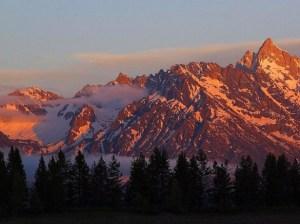By CYNDY COLE

The San Francisco Peaks, sacred to several indigenous nations in northern Arizona.
The Hopi Tribe filed suit Wednesday in federal court in the District of Columbia, seeking an injunction to block snowmaking with reclaimed wastewater at Arizona Snowbowl this winter because of a threatened plant.
The case has been assigned to a judge, but there has been no decision at this point as to whether the lawsuit could delay snowmaking at Snowbowl.
The tribe contends the Coconino National Forest didn’t adequately consider some of the compounds found in the treated effluent and the possibility that the snow could blow more than 1,000 yards in low winds onto endangered plants.
“Snow transport from the proposed snowmaking will cause an increase in nitrogen, phosphorus and moisture available to areas outside the ski area, increasing the potential for colonization by invasive plant species,” the tribe stated in its suit, filed by Washington, D.C. attorney Michael Goodstein.
“I’m sure this is a last-ditch effort to try to stop us. Our focus is on preparing for the ski season. And I’m sure that this, too, will take its course,” said Snowbowl General Manager J.R. Murray.
Snowbowl has said it intends to have its snowmaking system up and running in time to open by Christmas, if needed.
The suit asserts that some of the remnants in the wastewater could essentially give other plants a competitive advantage over the San Francisco Peaks Ragwort, a plant found only above 10,900 feet on the Peaks and federally listed as threatened.
The Coconino National Forest looked at the issue of snowmaking and the ragwort in 2004 and found that there wasn’t a biological concern because “there will be no snowmaking in any areas where there are any known plant populations.”
The Hopi Tribe sued the city of Flagstaff regarding its sale of reclaimed water to Snowbowl and lost on multiple arguments.
It also hired SWCA Environmental Consultants to look at the project, and SWCA found that the agency had failed to account for wind in its analysis.
“There’s the potential for this sewage-effluent-made snow to drift and to blow in high-wind periods into the area for the San Francisco Peaks Ragwort,” said Steven Carothers, founder of SWCA.
Reclaimed water could be bad if it gives grasses or other plants in that cold, alpine terrain an advantage in outgrowing the ragwort, he said. “The water has over twice as much background nitrogen in it, and phosphorus, and nitrogen and phosphorus are the basic ingredients in fertilizers,” he said.
The tribe raised this complaint repeatedly, and again in April.
The Coconino National Forest began looking to see whether it thought the potential impact to the plant was an issue, but has yet to make a determination.
The U.S. Fish and Wildlife Service, the agency responsible for oversight of rare and endangered species, must also make a decision about whether snowmaking probably won’t affect the plant, might, or probably will.
As of Thursday, the Coconino National Forest was actually looking at whether it thought snowmaking was likely or unlikely to affect the plant, but it declined comment due to pending litigation.
Cyndy Cole can be reached at [email protected] or at 913-8607.

